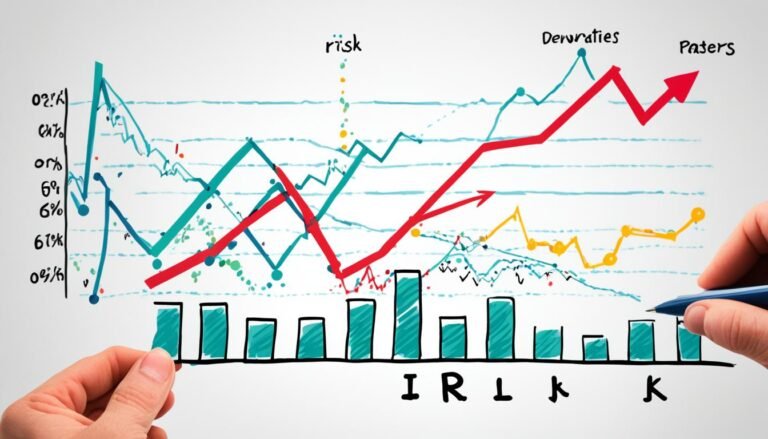Success in Sustainable and Responsible Investing
Did you know that over half of individual investors plan to increase their allocations to sustainable investments in the next year? According to a survey by the Morgan Stanley Institute for Sustainable Investing and Morgan Stanley Wealth Management, more than 70% of investors believe that strong ESG practices can lead to higher returns. This statistic highlights the growing interest in sustainable and responsible investing, where individuals seek to achieve market-rate financial returns while also considering positive social and environmental impacts.
Key Takeaways:
- More than half of individual investors plan to increase their allocations to sustainable investments in the next year.
- Over 70% of investors believe that strong ESG practices can lead to higher returns.
- Sustainable investing aims to achieve market-rate financial returns while considering positive social and environmental impacts.
Growing Interest in Sustainable Investing
The survey by the Morgan Stanley Institute for Sustainable Investing found that over three-quarters of individual investors globally are interested in investing in companies or funds that aim to achieve market-rate financial returns while also considering positive social and environmental impact. More than half of investors say their interest in sustainable investing has increased in the last two years, and they anticipate boosting allocations to sustainable investments in the next year. Factors contributing to the growing interest in sustainable investing include new climate science findings and the financial performance of sustainable investments. The majority of investors also believe that companies should address environmental and social issues.
Investor Preferences and Priorities
The survey findings highlight the strong preferences and priorities of global investors when it comes to sustainable investing. Nearly 80% of investors consider a company’s reporting on its carbon footprint and commitment to reducing greenhouse gas emissions before making new investments. This reflects a growing concern for climate action and a desire to support companies that prioritize environmental sustainability.
Theme Preferences:
Investors have shown a keen interest in specific sustainable investing themes. The top themes include:
- Climate Action
- Healthcare
- Water Solutions
- Circular Economy
These themes resonate with investors who seek to support companies that address pressing global challenges and contribute to positive social and environmental outcomes.
Investor Priorities:
Investors prioritize companies that demonstrate proactive planning to protect long-term value and align with climate science. They value decarbonization strategies and expect companies to develop robust plans to reduce their carbon footprint. Additionally, investors are interested in reducing the carbon footprint of their own portfolios and are willing to purchase carbon offsets if available.
Barriers and Concerns:
Transparency and trust in reported Environmental, Social, and Governance (ESG) data are key concerns for investors. They want to ensure that companies are genuinely committed to sustainable practices and not engaging in greenwashing. Greenwashing refers to the misleading or false claims made by companies concerning their environmental or social impact.
To summarize, investors’ sustainable investing preferences revolve around climate action, healthcare, water solutions, and circular economy themes. They prioritize companies with proactive sustainability plans and express concerns about greenwashing and the need for transparent ESG reporting.
| Top Sustainable Investing Themes | Investors’ Preferences |
|---|---|
| Climate Action | Investors support companies contributing to climate action and reducing greenhouse gas emissions. |
| Healthcare | Investors focus on companies that provide sustainable healthcare solutions and contribute to improved global health. |
| Water Solutions | Investors prioritize companies addressing water scarcity and promoting sustainable water management. |
| Circular Economy | Investors value companies that embrace circular economy principles, minimizing waste and promoting resource reuse. |
The Rise of ESG Investing
ESG (Environmental, Social, and Governance) criteria have become a crucial consideration for global investors, signaling a growing interest in businesses that prioritize sustainability and social responsibility. In 2022, a staggering 89% of global investors adopted ESG criteria, reflecting the widespread recognition of ESG factors as integral to investment decision-making.
When evaluating companies based on ESG criteria, environmental sustainability plays a significant role. Investors consider a company’s impact on climate change, its carbon emissions, energy efficiency, waste management practices, and conservation of valuable resources. By scrutinizing these environmental factors, investors can assess a company’s commitment to minimizing its ecological footprint and ensuring a more sustainable future.
Social factors are also essential considerations. Investors seek companies with exemplary labor practices, demonstrated commitment to human rights, social inclusion, and proactive community engagement. By examining a company’s social accountability, investors can support organizations that prioritize fair and ethical practices, contributing to a more just and equitable society.
Furthermore, the governance of a company plays a vital role in ESG investing. Investors carefully evaluate executive compensation structures, board diversity, shareholder rights, and anti-corruption policies to assess a company’s commitment to responsible business practices. By focusing on these governance factors, investors can choose companies that prioritize transparency, fair corporate practices, and long-term value creation.
ESG investing trends reflect a global shift towards sustainable and responsible investment strategies. Environmental sustainability, social accountability, and strong governance have emerged as core considerations for global investors seeking to align their investment portfolios with their values. As the importance of ESG criteria continues to rise, so too does the opportunity for investment in companies that prioritize sustainability and social responsibility.
| Factors | Description |
|---|---|
| Environmental | A company’s impact on climate change, carbon emissions, energy efficiency, waste management, and resource conservation. |
| Social | Labor practices, human rights, social inclusion, and community engagement. |
| Governance | Executive compensation, board diversity, shareholder rights, and anti-corruption policies. |
Investor Demographics and ESG Interest
When it comes to ESG (Environmental, Social, and Governance) investing, certain demographics have shown a heightened interest. Millennials, women, and high-net-worth individuals are among those who are particularly engaged in this investment approach.
Millennials are often driven by a desire to contribute to positive change in society and the environment. They are concerned about pressing issues such as climate change, social inequality, and human rights. ESG investing provides them with an avenue to address these matters through their investment choices. By allocating their capital to companies that prioritize sustainability and social responsibility, millennials can align their financial goals with their values and contribute to creating a better future.
Women have also demonstrated a greater inclination towards considering ESG factors in their investment decisions. They prioritize gender diversity and environmental sustainability when choosing where to invest their money. Women recognize the significance of inclusive and environmentally responsible business practices, and they aim to support companies that exhibit these values through their investment portfolios.
High-net-worth individuals have been increasingly interested in aligning their investments with their values. These individuals have the means to invest in a way that positively impacts society. By directing their funds towards companies that engage in sustainable and responsible practices, high-net-worth individuals can contribute to social and environmental progress. Moreover, ESG investing offers them the opportunity to manage risk effectively and enhance long-term returns.
Overall, ESG investing has attracted the attention of millennials, women, and high-net-worth individuals who recognize the potential of investing in a way that aligns with their values and promotes positive change. By embracing ESG principles, these investors not only seek financial gains but also endeavor to make a meaningful impact on the world.
| Demographic | ESG Investing Interest |
|---|---|
| Millennials | High |
| Women | Significant |
| High-Net-Worth Individuals | Considerable |
The Benefits of Sustainable Investing
Sustainable investing offers numerous benefits, debunking the misconception that it underperforms. Studies reveal that sustainable investment funds perform on par with other funds and even provide lower downside risk. By adopting a long-term perspective, investors can reduce the likelihood of incurring losses. Moreover, sustainable investing drives innovation in sectors such as clean energy, technology, and healthcare, offering unique growth opportunities.
A report by Morgan Stanley estimates that assets in sustainable investing are projected to reach almost $34 trillion by 2026. This surge in sustainable investing presents tremendous investment potential, allowing investors to align their financial goals with their values.
“Sustainable investing provides an avenue to generate financial returns while contributing to positive environmental and social impact. It is not just an ethical choice but a sound financial strategy.”
Sustainable Investing Benefits
To shed light on the advantages of sustainable investing, let’s explore some key benefits:
- Financial Returns: Sustainable investment funds have demonstrated comparable performance to traditional funds, proving that investing with a conscience does not entail sacrificing financial gains.
- Long-Term Perspective: By focusing on long-term value creation, sustainable investors can mitigate short-term market volatility and better position themselves for stable returns over time.
- Innovation and Opportunity: Investing in sustainable companies fosters innovation across various industries such as clean energy, technology, and healthcare. This opens up new investment opportunities and drives positive global change.
By embracing sustainable investing, individuals can contribute to creating a better world while achieving their financial objectives.
| Benefits of Sustainable Investing | Description |
|---|---|
| Financial Returns | Sustainable investment funds perform on par with traditional funds, ensuring competitive financial returns. |
| Long-Term Perspective | Investing with a long-term horizon minimizes the impact of short-term market volatility and enhances the potential for stable returns. |
| Innovation and Opportunity | Sustainable investing drives innovation and presents unique growth opportunities in sectors such as clean energy, technology, and healthcare. |
Investment Products for Sustainable Investing
When it comes to sustainable investing, there is a wide range of investment products available to investors. These products allow individuals to align their investment goals with their values, contributing to positive social and environmental impact. Let’s explore some of the key sustainable investment products:
SRI Funds and ESG Funds
Socially Responsible Investing (SRI) funds and Environmental, Social, and Governance (ESG) funds are exchange-traded funds (ETFs) that prioritize investments in companies with a strong commitment to ethical, social, or environmental values. These funds consider companies’ ESG ratings and their dedication to sustainability when selecting investments. SRI funds and ESG funds provide investors with an opportunity to support businesses that prioritize positive change.
Green Bonds
Green bonds are debt securities issued to raise funds specifically for environmentally sustainable projects. These projects can range from renewable energy initiatives to sustainable infrastructure projects. By investing in green bonds, investors contribute to the financing of projects that have a direct positive impact on the environment, while also potentially earning financial returns.
Green REITs
Green Real Estate Investment Trusts (REITs) are companies that invest in environmentally friendly properties or those with high ESG ratings. These properties may include energy-efficient buildings, sustainable housing projects, or commercial spaces with eco-friendly features. Investing in green REITs provides individuals with an opportunity to support sustainable real estate development while potentially earning rental income or capital appreciation.
Individual Stocks
Individual stocks can also be considered for sustainable investing. Investors can focus on selecting stocks of companies that demonstrate robust measures for limiting carbon emissions, promoting renewable energy, or implementing sustainable business practices. By carefully evaluating a company’s sustainability efforts, investors can support businesses that align with their values while potentially benefiting from the company’s financial growth.
Here’s an overview of the investment products for sustainable investing:
| Investment Product | Description |
|---|---|
| SRI Funds and ESG Funds | ETFs that invest in companies with a dedication to ethical, social, or environmental values and high ESG ratings. |
| Green Bonds | Debt securities issued to raise funds for environmentally sustainable projects. |
| Green REITs | Companies that invest in eco-friendly properties or those with high ESG ratings. |
| Individual Stocks | Stocks of companies with robust measures for limiting carbon emissions. |
When choosing investment products for sustainable investing, it’s important to carefully consider the alignment of these products with your values and financial goals. By investing in sustainable businesses and projects, individuals can make a positive impact while potentially achieving financial returns.
Best Practices for Sustainable Investing
When it comes to sustainable investing, following best practices is crucial for success. By implementing these practices, investors can align their financial and non-financial goals with their sustainable investment strategies. Here are some key best practices to consider:
- Defining Clear Goals: Start by defining your financial objectives and non-financial values. Consider your sustainability priorities and what impact you want your investments to have. This will guide your decision-making process and ensure alignment with your values.
- Diligent Research: Stay informed about evolving sustainable investing principles, trends, and industry developments. Conduct thorough research on companies, funds, and investment opportunities to understand their ESG (Environmental, Social, and Governance) practices and their potential for financial returns.
- Avoiding Greenwashing: Greenwashing refers to companies making false or exaggerated claims about their sustainable practices. Scrutinize a company’s sustainability claims by looking for credible certifications, reviewing their sustainability reports, and considering third-party ratings. Avoid investing in companies that engage in greenwashing practices.
- Adopting Investment Strategies: Explore different sustainable investment strategies, such as positive and negative screening, portfolio tilt, activist investing, and themed investing. These strategies allow you to shape your portfolio based on specific sustainability themes or values.
To illustrate the effectiveness of sustainable investment strategies, consider the following example:
| Investment Strategy | Description |
|---|---|
| Positive Screening | Selecting investments that meet specific ESG criteria, such as companies with strong environmental practices or those promoting social justice. |
| Negative Screening | Excluding investments that are involved in controversial activities or have poor ESG performance, such as companies tied to fossil fuels or human rights violations. |
| Portfolio Tilt | Allocating a larger portion of your portfolio to sustainable investments, thereby increasing the overall sustainability of your portfolio. |
| Activist Investing | Engaging with companies as an active shareholder to advocate for improved ESG practices or influence positive change. |
| Themed Investing | Investing in companies or funds that focus on specific sustainability themes, such as renewable energy, clean technology, or gender equality. |
Remember, sustainable investing is about making a positive impact without compromising financial returns. By following these best practices, you can align your investments with your values while maximizing your potential for long-term success.
Corporate Governance in Sustainable Investing
Corporate governance plays a crucial role in sustainable investing, as it allows investors to assess a company’s commitment to ESG factors. By examining corporate governance structures, investors can determine if a company aligns with sustainability goals and practices. Several key factors are considered in this evaluation process:
- Board Diversity: Investors look for companies with diverse boards that represent different perspectives and experiences, including gender and ethnicity. A diverse board is more likely to consider a wide range of ESG issues.
- Executive Compensation: Companies that tie executive compensation to sustainability goals demonstrate a strong commitment to ESG factors. Such compensation structures incentivize executives to prioritize environmental and social sustainability in their decision-making.
- Transparent Reporting: Transparent reporting mechanisms ensure that companies provide accurate and reliable information regarding their ESG performance. Investors rely on transparent reporting to assess a company’s sustainability practices and progress, facilitating informed investment decisions.
In addition to evaluating corporate governance structures, shareholder activism plays a significant role in driving positive change. Shareholders can engage with companies through dialogues, proxy voting, and shareholder resolutions to advocate for enhanced sustainability practices. This activism not only encourages companies to prioritize environmental benefits but also supports the adoption of renewable energy and sustainable business models.
Furthermore, transparent reporting on ESG metrics is of paramount importance in sustainable investing. Investors rely on ESG reporting to assess a company’s sustainability performance and ensure its adherence to ESG criteria. Transparent reporting provides investors with the necessary information to evaluate a company’s environmental, social, and governance practices, enabling them to make informed investment decisions.
The Importance of Education in Sustainable Investing
Continued education is vital for success in sustainable investing. The sustainability industry is constantly evolving, and investors must stay informed to capitalize on emerging trends, seize opportunities, and navigate challenges. By learning about sustainable and ethical investing, investors can prepare themselves for the forthcoming opportunities presented by a world grappling with climate change. Moreover, education empowers individuals to actively participate in positive change in the market and the world at large.
Education plays a crucial role in helping investors understand the evolving trends, strategies, and best practices associated with successful sustainable investing in various investment assets. Through education, investors gain valuable insights into innovative sustainable investment options and the potential risks and rewards they entail. By gaining a deep understanding of the sustainable investment landscape, investors can make informed decisions that align with their financial objectives and ethical values.
“Education is the most powerful weapon which you can use to change the world.” – Nelson Mandela
In an ever-changing financial landscape, education empowers investors to adapt to evolving trends. By staying up-to-date with the latest research, reports, and news in sustainable investing, investors can position themselves to make informed decisions and capitalize on emerging opportunities. Education helps investors identify potential pitfalls and challenges in the sustainable investing field, enabling them to navigate these obstacles with confidence.
By investing in their own education, individuals can become advocates for sustainable investing both within their own portfolios and in broader society. They can leverage their knowledge to drive conversations surrounding sustainable finance, inspire others to embrace sustainable investment practices, and encourage companies to prioritize environmental, social, and governance (ESG) factors.
Embracing Sustainable Education
When it comes to sustainable investing education, there are numerous avenues to explore. Online courses, webinars, and workshops offered by reputable institutions and industry experts provide in-depth knowledge and practical insights into sustainable investment strategies. There are also books, articles, and research papers that cover various aspects of sustainable investing.
Additionally, seeking guidance from financial advisors who specialize in sustainable investing can provide valuable assistance in navigating the complexities of sustainable investment strategies. They can help investors align their financial goals with their sustainable investment objectives and offer personalized advice tailored to individual circumstances.
Investing in education is a key component of building a foundation for success in sustainable investing. By equipping themselves with knowledge, investors can position themselves to make informed decisions, seize opportunities, and contribute to positive change in the market and the world.
Conclusion
Sustainable investing not only provides the opportunity for financial success but also allows investors to make a positive impact on society and the environment. As interest in sustainability continues to grow, individuals can align their investment strategies with their values. By considering Environmental, Social, and Governance (ESG) criteria and engaging in sustainable investing, investors can contribute to positive change in the corporate world.
In order to achieve sustainable investment goals, it is crucial for investors to stay educated and informed about evolving sustainable investing strategies. Continued education will help investors navigate the ever-changing landscape of sustainable investing and take advantage of emerging opportunities. Adhering to best practices, such as defining clear goals, conducting diligent research, and avoiding greenwashing, will also be instrumental in achieving success in sustainable and responsible investing.
The future of sustainable investing looks promising, with a diverse range of sustainable investment products available to investors. As the field expands, there is potential for innovation and growth in sectors such as clean energy, technology, and healthcare. By embracing sustainable investing, individuals can not only secure their financial future but also contribute to a more sustainable and responsible world.







